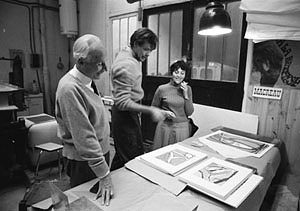About his contact with Beckett in Paris, before and during World War 2.
1970's
Fuente: article "Schilder Bram van Velde in Dordrecht," in: NRC Handelsblad by Paul Groot, 1979 (English translation: Charlotte Burgmans)
Bram van Velde: Frases en inglés
11 August 1972; pp. 90-91
1970's, Conversations with Samuel Beckett and Bram van Velde (1970 - 1972)
“However terrible it is, the thing never involves any sadness”
1970's, Conversations with Samuel Beckett and Bram van Velde (1970 - 1972)
Letter to H.P. Bremmer, 17-11-1930, City Archive The Hague, as quoted in: Bram van Velde, A Tribute, Municipal Museum De Lakenhal Leiden, Municipal Museum Schiedam, Museum de Wieger, Deurne 1994, p. 50 (English translation: Charlotte Burgmans)
1930's
1960's, Conversations with Samuel Beckett and Bram van Velde' (1965 - 1969)
1960's, Conversations with Samuel Beckett and Bram van Velde' (1965 - 1969)
1970's, Conversations with Samuel Beckett and Bram van Velde (1970 - 1972)
“An artist’s life is all very fine and moving. But only in retrospect. In books.”
1960's, Conversations with Samuel Beckett and Bram van Velde' (1965 - 1969)
“I am in the void. Nothing to hang on to.”
1960's, Conversations with Samuel Beckett and Bram van Velde' (1965 - 1969)
short quotes, 3 April 1972; p. 86
1970's, Conversations with Samuel Beckett and Bram van Velde (1970 - 1972)
3 April 1972; p. 90
1970's, Conversations with Samuel Beckett and Bram van Velde (1970 - 1972)
“There’s always doubt. There’s nothing you can get hold of.”
1960's, Conversations with Samuel Beckett and Bram van Velde' (1965 - 1969)
“To be nothing. Just nothing. It’s a frightening experience. You have to let go of everything.”
1960's, Conversations with Samuel Beckett and Bram van Velde' (1965 - 1969)
“At is taking risks.... a sincere attempt to achieve the impossible, the unknown.”
short quotes, 14 September 1967; p. 68
1960's, Conversations with Samuel Beckett and Bram van Velde' (1965 - 1969)
1960's, Conversations with Samuel Beckett and Bram van Velde' (1965 - 1969)
“When you get to the bottom, you discover that there is no room for pride. That’s what I paint.”
short quotes, 28 December 1967; p. 69
1960's, Conversations with Samuel Beckett and Bram van Velde' (1965 - 1969)
short quotes, 2 November 1971 pp. 84-85
1970's, Conversations with Samuel Beckett and Bram van Velde (1970 - 1972)
“I have to try to see where seeing is no longer possible, where visibility is gone.”
1960's, Conversations with Samuel Beckett and Bram van Velde' (1965 - 1969)
“The artist is the bearer of life.”
1960's, Conversations with Samuel Beckett and Bram van Velde' (1965 - 1969)
Letter to H. E. Kramer, 28-07-1929, as quoted in: Bram van Velde, A Tribute, Municipal Museum De Lakenhal Leiden, Municipal Museum Schiedam, Museum de Wieger, Deurne 1994 (English translation: Charlotte Burgmans)
1920's
1970's, Conversations with Samuel Beckett and Bram van Velde (1970 - 1972)
“There is only the present. A painting is an instant of time that has escaped oblivion.”
1970's, Conversations with Samuel Beckett and Bram van Velde (1970 - 1972)
“I paint the impossibility of painting.”
1960's, Conversations with Samuel Beckett and Bram van Velde' (1965 - 1969)
“Painting lives only through the slide towards the unknown in oneself.”
1970's, Conversations with Samuel Beckett and Bram van Velde (1970 - 1972)
“I can’t say anything. There are no words.”
1960's, Conversations with Samuel Beckett and Bram van Velde' (1965 - 1969)
“Yes, perhaps there is some enjoyment in it [his paintings] too, somewhere.”
short quotes, 13 April 1968; p. 70
1960's, Conversations with Samuel Beckett and Bram van Velde' (1965 - 1969)
“Artists don’t live in the everyday world. That’s why people think they’re an odd bunch.”
1960's, Conversations with Samuel Beckett and Bram van Velde' (1965 - 1969)
short quotes, 14 September 1967; p. 67
1960's, Conversations with Samuel Beckett and Bram van Velde' (1965 - 1969)
two short quotes, 24 August 1970; p. 78
1970's, Conversations with Samuel Beckett and Bram van Velde (1970 - 1972)
“The artist is living a secret that he has to make manifest”
1960's, Conversations with Samuel Beckett and Bram van Velde' (1965 - 1969)
